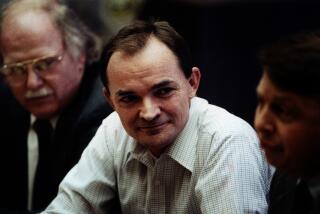Pair Journey to Sort Out Son’s Death : Father Gives Key Testimony in Kraft Trial
- Share via
Clayton and Liz Church flew 3,000 miles to hear testimony Thursday about the death of their son at the Randy Steven Kraft murder trial in Santa Ana.
The couple did well until the lights went out and enlarged photographs were shown of their son’s body in plants near the San Gabriel River Freeway in Seal Beach. At first Liz Church tightened her grip on her husband’s hand, then she bolted from the courtroom. People the Churches had just met, including family of some of Kraft’s other alleged young male victims, gathered around her to offer support.
Eric Herbert Church, 21, whose body was found Jan. 27, 1983, is the fourth of 16 young men that jurors have heard about in detail during two weeks of prosecution testimony.
Kraft is accused of murdering the 16 victims between 1972 and 1983, when he was arrested on the San Diego Freeway after a dead Marine was found in his car. Some legal experts in Orange County believe that his trial may be the biggest and costliest ever conducted in the state.
Prosecutors consider the Church case to be one of the strongest they have against the 43-year-old computer programmer from Long Beach.
They contend that a maroon fiber found on the arm of another victim, Geoffrey Alan Nelson, came from the socks Church was wearing when his body was found.
Prosecutors also point to a picture found in Kraft’s car of a young man in jeans and a jacket whose face cannot be seen. Orange County Sheriff’s Department criminalist James M. White testified Thursday that marks on the jeans in that photograph are in the same place as marks found on the jeans Church was wearing at the time of his death.
Prosecutors also said Thursday that the jacket and belt in the photograph have marks “consistent” with those on a jacket and belt found in the garage of Kraft’s Long Beach home. Prosecutors contend that they are the clothing items.
But prosecutors believe that one of the strongest pieces of evidence in the Kraft trial is a double-headed electric shaver found at Kraft’s residence.
The shaver was one reason the Churches made the trip from their home in Coventry, Conn. Clayton Church testified Thursday that the shaver, broken when he bought it at a flea market, was the one he had given his son before he left home to hitchhike around the country. On Thursday, Church identified a knot he had tied in the cord to rewire it.
But both Churches said outside the courtroom that they wanted to attend the trial anyway, to hear the evidence about their son’s death.
Liz Church, pensive and red-faced from crying most of the day, returned to the courtroom after Deputy Dist. Atty. Bryan F. Brown finished presenting photographs of the body.
After the day’s testimony ended, she told others concerned about her that she was OK.
“I still haven’t sorted it all out,” she said about her son’s death.
The Churches, who arrived from Connecticut on Wednesday, were not alone in court. Mary Shaheen of the county’s Victim Witness Program stayed with them and held on to Liz Church while her husband testified.
“She’s been marvelous,” Clayton Church said of Shaheen.
Kraft’s attorneys attacked the prosecution’s contentions about much of the evidence introduced in the Church case. Defense attorney James G. Merwin offered his own theories about the electric shaver. Perhaps Eric Church hocked it for money, or perhaps other people have rewired their shavers the same way Clayton Church did, he suggested.
Merwin also showed the defense’s own copies of the photograph of the young man in jeans and jacket found in Kraft’s car. Merwin asked White about a mark on the jacket that Merwin claimed was a hole. No similar hole was found in the jacket in Kraft’s garage, he said.
“If that is a hole, this is not the same jacket, is that right?” Merwin asked.
But White responded that the mark Merwin suggested was a hole in the jacket “looks to me like a defect in the photograph.”
More to Read
Sign up for Essential California
The most important California stories and recommendations in your inbox every morning.
You may occasionally receive promotional content from the Los Angeles Times.













